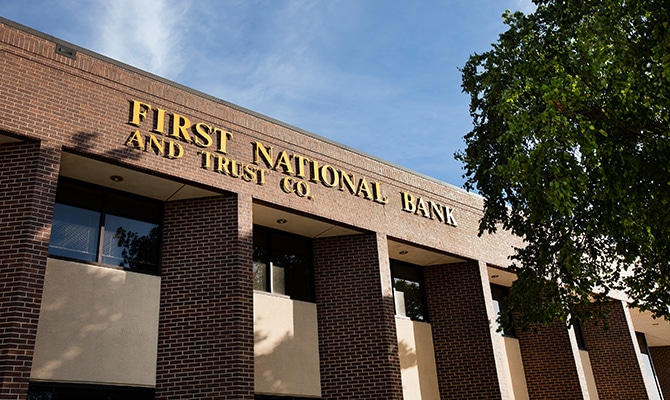For most people, buying a home is likely to be the biggest purchase of their lives. It can be overwhelming for anyone — but for first-time buyers especially, navigating the real estate world can be downright terrifying.
That’s why it’s important to talk to First National Bank & Trust first. FNB’s mortgage loan team is there to alleviate any and all concerns and help make the home buying process as smooth and painless as possible.
Mortgage Loan Officer Jeff Scroggins and Mortgage Loan Processor Rachel Vallandingham came up with potential red flags, things to keep in mind and specific benefits for Citizen Potawatomi Nation tribal members.

Government program for Tribal members
The U.S. Department of Housing and Urban Development offers a special program for tribal citizens called the Section 184 Indian Home Loan Guarantee Program. With Section 184 financing, borrowers can purchase a home and be guaranteed a low down payment and flexible underwriting. There’s no minimum credit score required to qualify; however, the HUD program is fairly strict on applicants’ credit history.
The Citizen Potawatomi Nation also offers a $20,000 second mortgage program for Oklahomans through its housing department. It has no monthly payments, and once you’ve lived in the house for 10 years, the Tribe will forgive that mortgage. To learn more about this offer, call the Citizen Potawatomi Nation Housing Department at (405) 273-2833.
General things to take into consideration
Unlike buying a new home, when you purchase a home from someone else, you can generally have the seller pay for a good portion of closing costs. Every little bit makes a difference.
Also, one of the biggest things people don’t realize is how little of a benefit a bigger down payment will have on monthly payments. An extra $5,000 down payment, for example, would only decrease a monthly payment by about $23. Most people would be better off using that $5,000 to pay off a credit card that could be costing them $100 a month in interest.
Knowing what you can afford
When you talk to FNB about buying a new home, we’ll ask for your monthly income and payment information to determine an appropriate loan amount. We also take into consideration the level of house payment you’ll be most comfortable with financially. Fun fact: oftentimes a customer will have a specific payment in mind, but generally, they can actually afford more.
The inside scoop on interest rates
Rates are changing constantly due to the current turmoil in the economy. If someone is planning to close on a house in the next 30 days, they typically won’t lock in their rate because they wait to see what the market does. But in today’s climate, you may be better off locking in quickly so you know what you’re going to get. However, even with the market turmoil, rates are better today than they were a year ago.
Why shopping around is important
When it comes to homeowner’s insurance, start with the company where you get your car insurance, but be sure to shop around. One of our loan officers recently shopped around, and he received rate quotes ranging from $1,700 to $3,600.
Every bank makes the same sort of home loan. If you shop around and one bank tells you something completely different, that should be a red flag.
Always review policy changes
Whenever you receive your yearly renewal notice, be sure to look it over for any changes. For example, a lot of companies will no longer help pay to replace your roof if it’s more than 10 years old, and they simply won’t tell you that.
Another thing to pay close attention to is the deductible on wind and hail. We’ve seen many instances where the deductible for a roof claim has doubled and the monthly premium has increased, yet the homeowner had no idea. It’s your responsibility to be extra diligent.
When to refinance
If you’re contacted by a mortgage company to refinance your home, you should consider your goal. Are you interested in taking cash out for debt consolidation, or are you simply seeing if you can get a better rate? The average closing cost is about $3,500. You need to recover that expense within a couple of years to make refinancing worthwhile. The general guideline is you should be able to recover that money in one to three years.
If you absolutely know you’ll be in your home for a while longer — say seven years or more — then you could stretch the recovery period out a little longer.
Talk to FNB, first
We enjoy walking our customers through the home buying process and making them feel relaxed. Buying a home is a big commitment, and we want to give them peace of mind every step of the way.
Plus, we’re committed to supporting local merchants by putting our earnings back into the community. First National Bank & Trust is the only locally-owned financial institution in Shawnee. There’s something to be said for doing business with your neighbors.
For information regarding loan products and lending requirements at First National Bank & Trust, please contact Mortgage Loan Officer Jeff Scroggins or Mortgage Loan Processor Rachel Vallandingham at 405-275-8330.
